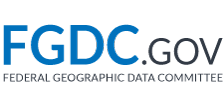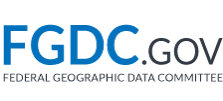FOR FURTHER INFORMATION CONTACT
SUMMARY
The Federal Geographic Data Committee (FGDC) is conducting a public review of the draft National Shoreline Data Content Standard.
The FGDC has developed a draft National Shoreline Data Content Standard that provides a framework for shoreline data development, sharing of data, and shoreline data transformation and fusion. The FGDC Coastal and Marine Spatial Data Subcommittee, chaired by the National Oceanic and Atmospheric Administration (NOAA), sponsored development of the draft standard. The FGDC Coordination Group, comprised of representatives of Federal agencies, has approved releasing this draft standard for public review and comment.
The draft National Shoreline Data Content Standard defines attributes or elements that are common for shoreline data development and provides suggested domains for the elements. The functional scope includes definition of data models, schemas, entities, relationships, definitions, and crosswalks to related standards. The draft National Shoreline Data Content Standard is intended to enhance the shoreline framework by providing technical guidance on shoreline semantics, data structures and their relationships to builders and users of shoreline data. The geographical scope of the draft standard comprises all shorelines of navigable waters within the United States and its territories.
The primary intended users of the National Shoreline Data Content Standard are the mapping, shoreline engineering, coastal zone management, flood insurance, and natural resource management communities. The FGDC invites all stakeholders to comment on this draft standard to ensure that it meets their needs.
The draft National Shoreline Data Content Standard may be downloaded from www.fgdc.gov/standards/ projects/FGDC-standards-projects/shoreline-data-content/revisedDraft NationalShorelineDataContent Standard. Comments shall be submitted using the content template at http://www.fgdc.gov/standards/process/standards-directives/template.doc. Instructions for completing the comment template are found in FGDC Standards Directive #2d, Standards Working Group Review Guidelines: Review Comment Template, http://www.fgdc.gov/standards/process/standards-directives/directive-2d-standards-working-group-review-guidelines-review-comment-template.
Comments that concern specific issues/changes/additions may result in revisions to the National Shoreline Data Content Standard. Reviewers may obtain information about how comments were addressed upon request. After formal endorsement of the standard by the FGDC, the National Shoreline Data Content Standard and a summary analysis of the changes will be made available to the public on the FGDC Web site, www.fgdc.gov.
DATES
Comments on the draft National Shoreline Data Content Standard shall be submitted by no later than July 31, 2013.
FOR FURTHER INFORMATION CONTACT
Ms. Julie Binder Maitra, U.S. Geological Survey, Federal Geographic Data Committee, jmaitra@fgdc.gov, 703–648– 4627.
SUPPLEMENTARY INFORMATION
The location of our national shoreline is fundamental for legal boundaries, developing nautical charts, and engaging in marine planning and other academic research and commercial activities. Shoreline is a commonly referenced feature, but one that includes multiple definitions and is difficult to precisely map and keep up-to-date. Effective use of shoreline data requires a highly defined logical data structure that is interoperable, efficient and applicable to a broad base of government and private sector uses. Current practices have led to a highly variable shoreline data infrastructure. The National Shoreline Data Content Standard is intended to enhance the shoreline framework by providing technical guidance on shoreline semantics, data structures and their relationships to builders and users of shoreline data.
Shoreline definition protocols currently limit agencies and organizations from effectively sharing and using shoreline coincident data. Agencies have expressed an interest for greater harmonization and uniformity to shoreline data content. Enhancing shoreline content and interoperability is technically feasible and timely in relation to hydrographic, hydrologic and other related standards development. The proposed standard will tie related protocols and existing content together in a new model using recognized reference material, definitions, semantics, and structures. Harmonizing shoreline content will lead to cost savings by reducing the time in design, data re-use, training, and implementation. In addition, harmonizing shoreline data content will assist in areas such as coastal research, historical shoreline change analysis, shoreline change prediction analysis, and the effects of relative sea level change. The National Shoreline Data Content Standard provides a framework for shoreline data development, sharing of data, and shoreline data transformation and fusion. The standard defines attributes or elements that are common for shoreline data development and provides suggested domains for the elements.
The geographical scope of the National Shoreline Data Content Standard comprises all shorelines of navigable waters within the United States and its territories. Navigable waters provide a channel for commerce and transportation of people and goods and as such are under the jurisdiction of the Federal Government.
The functional scope of the standard includes the definition of data models, schemas, entities, relationships, definitions, and crosswalks to related standards. Data discovery, transmittal, display, and delivery are not currently part of this standard.
The primary intended users of this standard are the mapping, shoreline engineering, coastal zone management, flood insurance, and natural resource management communities. The standard is intended to support the shoreline community in developing shoreline data to support data transformation, data fusion, and data sharing.
The FGDC coordinates the development of the National Spatial Data Infrastructure (NSDI), which encompasses the policies, standards, and procedures for organizations to cooperatively produce and share geospatial data. Federal agencies that make up the FGDC develop the NSDI in cooperation with organizations from State, local and tribal governments, the academic community, and the private sector. The authority for the FGDC is OMB Circular No. A–16 Revised on Coordination of Geographic Information and Related Spatial Data Activities (Revised August 19, 2002). More information on the FGDC and the NSDI is available at http://www.fgdc.gov. Standards are a foundational component of the NSDI.
See Federal Register notice Public Review of Draft National Shoreline Data Content Standard, published April 18, 2013 (accessed 2013-04-18).

